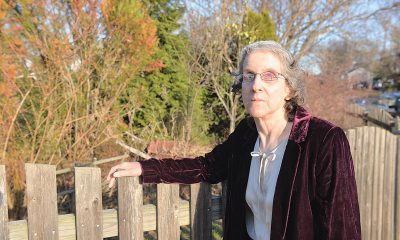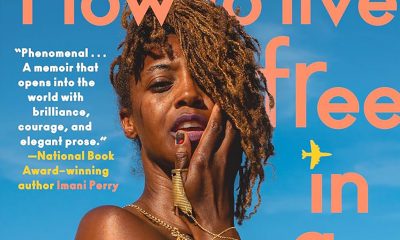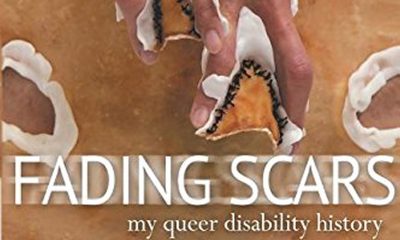Arts & Entertainment
Queer, Crip and Here: Meet blind writer Caitlin Hernandez
Author navigates intersecting identities in life, work
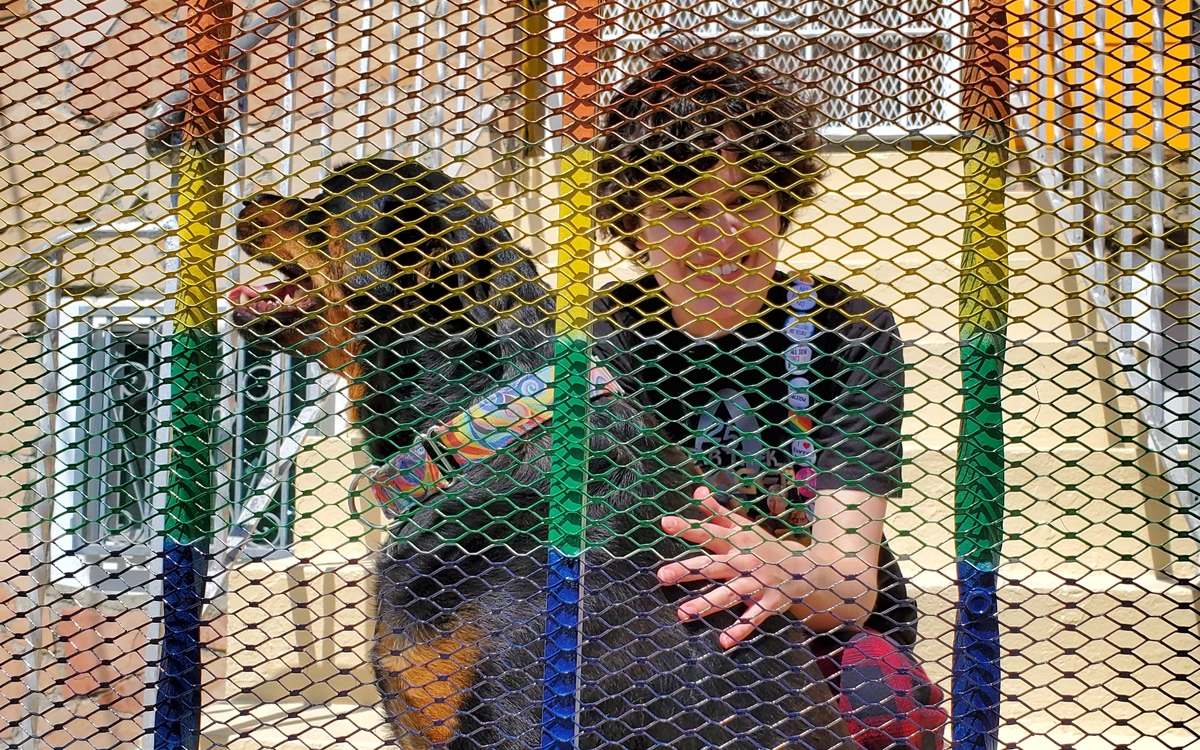
(Editor’s Note: One in four people in America has a disability, according to the Centers for Disease Control and Prevention. Queer and disabled people have long been a vital part of the LGBTQ+ community. Take two of the many queer history icons who were disabled: Michelangelo is believed to have been autistic. Marsha P. Johnson, who played a heroic role in the Stonewall Uprising, had physical and psychiatric disabilities. Today, Deaf/Blind fantasy writer Elsa Sjunneson; actor and bilateral amputee Eric Graise who played Marvin in the “Queer as Folk” reboot; and Kathy Martinez, a blind, Latinx lesbian, Assistant Secretary of Labor for Disability Employment Policy for the Obama administration, are only a few of the queer and disabled people in the LGBTQ community. Yet, the stories of this vital segment of the queer community have rarely been told. In its monthly, yearlong series, “Queer, Crip and Here,” the Blade will tell some of these un-heard stories.)
Some creators agonize for years before plunging into their art.
This wasn’t the case with queer, blind writer and teacher Caitlin Hernandez. Hernandez wrote her first “novel,” “Computer Whiz,” she writes in her bio, when she was in the fourth grade. She kept her monitor off so no one would see her “masterpiece.”
Reading and writing have been a part of Hernandez’s life for as long as she can remember. “I was writing, even as a little kid,” Hernandez, who was born in 1990 and grew up in Danville, Calif., said in a telephone interview with the Blade, “In first grade, I wrote stories in braille. They taught me to type. Because people were having to translate.”
As a kid, Hernandez used a tape recorder to tell stories. “That happens so often with blind kids,” said Hernandez, who lives in San Francisco with her partner Martha and Maite their Rottweiler.
Maite was Martha’s dog when the couple got together. “I call her my ‘stepdogter,’” Hernandez said. It’s clear from the get-go that she doesn’t take herself too seriously. Maite, her “stepdogter,” is “currently writing a picture book,” Hernandez jokes in her bio.
It’s commonly thought that disabled people lead sad, tragic lives. But Hernandez busts this myth. Martha, her partner, “reads braille with her eyes,” Hernandez whimsically writes in her bio.
Hernandez is committed to teaching and writing. But, she “loves eating coffee ice cream, watching Star Trek Voyager, singing, skipping and using her rainbow cane – sometimes all at once,” Hernandez writes in her bio.
Queerness is an integral part of Hernandez’s life: from her fiction, which tells stories of LGBTQ people, disabled people, and people of color to her rainbow cane.
“Queerness is considered cool now in many places,” Hernandez said, “it’s normalized.”
But that’s not true with disability, she added. “Generally, there’s more fear and misperceptions around disabled people,” Hernandez said.
Because of their discomfort with disabled people, she’s often left alone at social and literary gatherings.
“Because I’m blind, people frequently won’t talk to me,” Hernandez said, “even if I’ve read at an open mic.”
To make people feel more comfortable with her, Hernandez, totally blind since birth, sometimes uses a rainbow cane. “I designed it,” she said, “it has the colors of the rainbow flag. If you’re queer, you’ll get that.”
But it’s also beautiful because it’s a rainbow, Hernandez said, “It’s a great ice-breaker.”
(Hernandez uses her rainbow cane when she’s out with friends. When traveling by herself, she uses the white cane used by most blind people.)
Once people get to know [disabled people],” Hernandez said, “they’re chill with us.”
The Americans with Disabilities Act of 1990 (ADA), a landmark civil rights law, despite problems of enforcement and compliance, has done much to change life for disabled people.
The ADA generation (those born when or after the law was passed) has grown up with the expectation that disabled people have rights. They’re not surprised to see curb cuts or braille menus. They expect employers to make accommodations for disabled employees and hospitals to have sign language interpreters for Deaf people.
Yet despite the ADA, ableism persists (even within her own ADA generation), Hernandez said. A key reason why discomfort with and fear of disabled people is still so pervasive is the problem of representation, she said.
Hernandez, a Lambda Literary Emerging Writer Fellow in 2015 and 2018, is acutely aware of how disabled and queer and disabled people are portrayed in fiction and nonfiction.
“Our lives are often represented so badly,” Hernandez said, “often by nondisabled creators. There’s a lot of fear and inaccuracy.”
Thankfully, there are a few fab books with disabled characters by disabled authors, Hernandez said. She loves “The Kiss Quotient” by Helen Hoang, who is autistic. The novel portrays the romance of an autistic econometrician and her biracial male escort.
Hernandez is a fan of “The Silence Between us,” a young adult romance featuring a Deaf character, by hard-of-hearing author Alison Gervais.
“The Chance to Fly,” co-authored by Ali Stroker, the bisexual, Tony-winning actress who uses a wheelchair, and Stacy Davidowitz, is one of Hernandez’s faves. The book, a novel for middle-schoolers, tells the story of a theater-loving, wheelchair using girl, who defies ableist expectations.
Hernandez began to think she was queer when she was in high school. But, she didn’t come out then to anyone except a few of her friends. “They kinda didn’t believe me,” Hernandez said, “because a friend of ours had already come out as queer and they thought I was trying to copy him.”
After she was in college, Hernandez, who earned a bachelor’s degree in literature from the University of California, Santa Cruz in 2012, came out to her parents.
Her folks, now divorced, were fine with her being queer.
Because nondisabled people frequently don’t see disabled people as datable or sexy, some aspects of coming out are more difficult if you have a disability, Hernandez said. “We often miss one of the rites of passage of coming out,” she said, “of saying ‘I am queer – here with my queer date (or partner).’”
Hernandez’s first relationship was with a woman who was closeted. “We couldn’t be out,” she said.
Hernandez got together with her partner Martha in November 2019. Then there was the pandemic and everything was cancelled. “So we didn’t get to go out as an out queer couple,” Hernandez said.
“Everybody knows I’m partnered with Martha,” she added.
But because of ableism, sometimes people don’t see her as Martha’s romantic partner, Hernandez said.
Like many, Hernandez navigates intersecting identities. “I’m thinking more about my being of mixed race,” Hernandez said, “My Mom is white. My Dad is one-half Mexican and one-half German. I can pass as white,” she added.
She’s grappling with what it means to have a Latinx last name, Hernandez said.
She wishes she had taken Spanish. “But I took French,” Hernandez said, “I wanted to do what my friends were doing.”
As a writer, Hernandez hopes to help children who live with intersecting identities.
Her work has appeared in “Aromatica Poetica,” “Wordgathering” and in “Barriers and Belonging,” “Firsts: Coming Of Age Stories by People with Disabilities” and other anthologies.
In 2013, “Dreaming in Color,” a musical written by Hernandez, was produced by CRE Outreach at the Promenade Playhouse in Santa Monica, Calif.
Hernandez’s unpublished young adult novel “Even Touch Has a Tune” is about a queer, blind girl falling in love with another girl and surviving sexual assault, Hernandez said in an email to the Blade. “It’s fiction but has a lot of autobiographical content,” she added.
If you’re disabled, you’re more vulnerable to sexual assault. When she was a freshman, Hernandez became friends with a fully sighted guy who she’d met in her classes. “He seemed nice,” she said, “but then he came over and touched me inappropriately.”
“I froze up,” Hernandez added, “if you’re disabled, you’re vulnerable. You’re taught to be polite – to keep quiet.”
While there’s more representation of disabled people in fiction, Hernandez is still discouraged.
Because of ableism, many literary agents may not want her “disabled and assault novel,” Hernandez said. (Her unpublished YA novel “Even Touch Has a Tune” is represented by Emily Keyes of Keyes Agency.)
Too frequently, representation of disabled people is focused on ableist tropes like “inspiration porn” and “overcoming,” Hernandez said. There isn’t interest in portraying scary, difficult aspects (like sexual assaults) of disabled people’s lives, she added.
But discouragement doesn’t stop Hernandez from writing or from connecting with kids as a teacher.
Hernandez earned a master’s degree in special education and her teaching credentials from San Francisco State University in 2016. Today, she is a resource specialist with the San Francisco Unified School District.
Hernandez enjoys forging a connection with disabled and nondisabled students. “Nondisabled kids come to me for extra help,” she said.
Hernandez has accomplished much. But, “I’ve learned I don’t have to be a role model,” she said, “I don’t have to be perfect.”
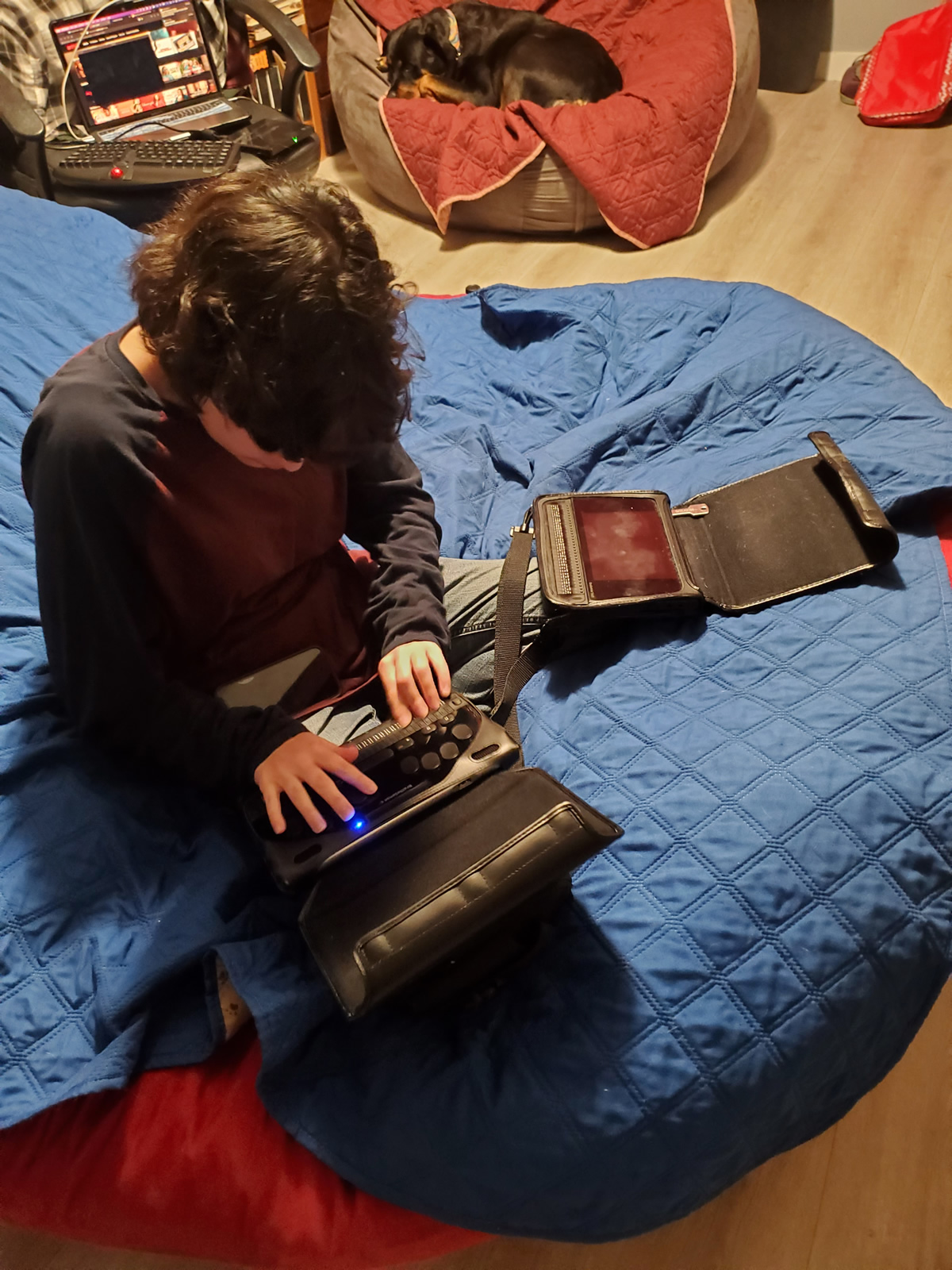
Books
Love or fear flying you’ll devour ‘Why Fly’
New book chronicles a lifetime obsession with aircraft

‘Why Fly’
By Caroline Paul
c. 2026, Bloomsbury
$27.99/256 pages
Tray table folded up.
Check. Your seat is in the upright position, the airflow above your head is just the way you like it, and you’re ready to go. The flight crew is making final preparations. The lights are off and the plane is backing up. All you need now is “Why Fly” by Caroline Paul, and buckle up.

When she was very young, Paul was “obsessed” with tales of adventure, devouring accounts written by men of their derring-do. The only female adventure-seeker she knew about then was Amelia Earhart; later, she learned of other adventuresome women, including aviatrix Bessie Coleman, and Paul was transfixed.
Time passed; Paul grew up to create a life of adventure all her own.
Then, the year her marriage started to fracture, she switched her obsession from general exploits to flight.
Specifically, Paul loves experimental aircraft, some of which, like her “trike,” can be made from a kit at home. Others, like Woodstock, her beloved yellow gyrocopter, are major purchases that operate under different FAA rules. All flying has rules, she says, even if it seems like it should be as freewheeling as the birds it mimics.
She loves the pre-flight checklist, which is pure anticipation as well as a series of safety measures; if only a relationship had the same ritual. Paul loves her hangar, as a place of comfort and for flight in all senses of the word. She enjoys thinking about historic tales of flying, going back before the Wright Brothers, and including a man who went aloft on a lawn chair via helium-filled weather balloons.
The mere idea that she can fly any time is like a gift to Paul.
She knows a lot of people are terrified of flying, but it’s near totally safe: generally, there’s a one in almost 14 million chance of perishing in a commercial airline disaster – although, to Paul’s embarrassment and her dismay, it’s possible that both the smallest planes and the grandest loves might crash.
If you’re a fan of flying, you know what to do here. If you fear it, pry your fingernails off the armrests, take a deep breath, and head to the shelves. “Why Fly” might help you change your mind.
It’s not just that author Caroline Paul enjoys being airborne, and she tells you. It’s not that she’s honest in her explanations of being in love and being aloft. It’s the meditative aura you’ll get as you’re reading this book that makes it so appealing, despite the sometimes technical information that may flummox you between the Zen-ness. It’s not overwhelming; it mixes well with the history Paul includes, biographies, the science, heartbreak, and exciting tales of adventure and risk, but it’s there. Readers and romantics who love the outdoors, can’t resist a good mountain, and crave activity won’t mind it, though, not at all.
If you own a plane – or want to – you’ll want this book, too. It’s a great waiting-at-the-airport tale, or a tuck-in-your-suitcase-for-later read. Find “Why Fly” and you’ll see that it’s an upright kind of book.
The Blade may receive commissions from qualifying purchases made via this post.
Theater
Out actor Kevin Cahoon on starring role in ‘Chez Joey’
Arena production adapted from Broadway classic ‘Pal Joey’

‘Chez Joey’
Through March 15
Arena Stage
1101 Sixth St., S.W.
Tickets start at $93
Arenastage.org
As Melvin Snyder in the new musical “Chez Joey,” out actor Kevin Cahoon plays a showbiz society columnist who goes by the name Mrs. Knickerbocker. He functions as a sort of liaison between café society and Chicago’s Black jazz scene circa 1940s. It’s a fun part replete with varied insights, music, and dance.
“Chez Joey” is adapted from the Broadway classic “Pal Joey” by Richard Rodgers and Lorenz Hart. It’s inspired by John O’Hara’s stories based on the exploits of a small-time nightclub singer published in The New Yorker.
A warm and humorous man, Cahoon loves his work. At just six, he began his career as a rodeo clown in Houston. He won the Star Search teen division at 13 singing songs like “Some People” from “Gypsy.” He studied theater at New York University and soon after graduating set to work playing sidekicks and comedic roles.
Over the years, Cahoon has played numerous queer parts in stage productions including “Hedwig and the Angry Inch,” “La Cage aux Folles,” “Rocky Horror” as well as Peanut in “Shucked,” and George the keyboardist in “The Wedding Singer,” “a sort of unicorn of its time,” says Cahoon.
Co-directed by Tony Goldwyn and the great Savion Glover, “Chez Joey” is a terrific and fun show filled with loads of talent. Its relevant new book is by Richard Lagravenese.
On a recent Monday off from work, Cahoon shared some thoughts on past and current happenings.
WASHINGTON BLADE: Is there a through line from Kevin, the six-year-old rodeo clown, to who we see now at Arena Stage?
KEVIN CAHOON: Anytime I want to land a joke in a theater piece it goes back to that rodeo clown. It doesn’t matter if it’s Arena’s intimate Kreeger Theatre or the big rodeo at the huge Houston Astrodome.
I was in the middle stadium and there was an announcer — a scene partner really. And we were doing a back and forth in hopes of getting laughs. At that young age I was trying to understand what it takes to get laughs. It’s all about timing. Every line.
BLADE: Originally, your part in “Chez Joey” Melvin was Melba who sings “Zip,” a clever woman reporter’s song. It was sort of a star feature, where they could just pop in a star in the run of “Pal Joey.”
CAHOON: That’s right. And in former versions it was played by Martha Plimpton and before her Elaine Stritch. For “Chez Joey,” we switched gender and storyline.
We attempted to do “Zip” up until two days before we had an audience at Arena. Unexpectedly they cut “Zip” and replaced it with a fun number called “I Like to Recognize the Tune,” a song more connected to the story.
BLADE: Wow. You must be a quick study.
CAHOON: Well, we’re working with a great band.
BLADE: You’ve played a lot of queer parts. Any thoughts on queer representation?
CAHOON: Oh yes, definitely. And I’ve been very lucky that I’ve had the chance to portray these characters and introduce them to the rest of the world. I feel honored.
After originating Edna, the hyena on Broadway in “The Lion King,” I left that to do “Hedwig and the Angry Inch” as standby for John Cameron Mitchell, doing one show a week for him.
Everyone thought I was crazy to leave the biggest musical of our time with a personal contract and getting paid more money that I’d ever made to get $400 a week at the downtown Jane Street Theatre in a dicey neighborhood.
At the time, I really felt like I was with cool kids. I guess I was. And I never regretted it.
BLADE: When you play new parts, do you create new backstories for the role?
CAHOON: Every single time! For Melvin, I suggested a line about chorus boys on Lakeshore Drive.
BLADE: What’s up next for Kevin Cahoon?
CAHOON: I’m about to do the New York Theatre Workshop Gala; I’ve been doing it for nine years in a row. It’s a huge job. I’ll also be producing the “Cats: The Jellicle Ball” opening on Broadway this spring; it’s a queer-centric uptown vogue ball with gay actor André de Shields reprising his role as “Old Deuteronomy.”
BLADE: There’s a huge amount of talent onstage in “Chez Joey.”
CAHOON: There is. I’m sharing a dressing room with Myles Frost who plays Joey. He won accolades for playing Michael Jackson on Broadway. We’ve become great friends. He’s a miracle to watch on stage. And Awa [Sal Secka], a D.C. local, is great. Every night the audience falls head over heels for her. When this show goes to New York, Awa will, no doubt, be a giant star.
BLADE: Do you think “Chez Joey” might be Broadway bound?
CAHOON: I have a good feeling it is. I’ve done shows out of town that have high hopes and pedigree, but don’t necessarily make it. “Chez Joey” is a small production, it’s funny, and audiences seem to love it.

The Capital Pride Alliance held the annual Pride Reveal event at The Schuyler at The Hamilton Hotel on Thursday, Feb. 26. The theme for this year’s Capital Pride was announced: “Exist. Resist. Have the audacity!”
(Washington Blade photos by Michael Key)























-

 India4 days ago
India4 days agoActivists push for better counting of transgender Indians in 2026 Census
-

 Advice4 days ago
Advice4 days agoDry January has isolated me from my friends
-

 District of Columbia4 days ago
District of Columbia4 days agoCapital Pride reveals 2026 theme
-

 National4 days ago
National4 days agoAfter layoffs at Advocate, parent company acquires ‘Them’ from Conde Nast

